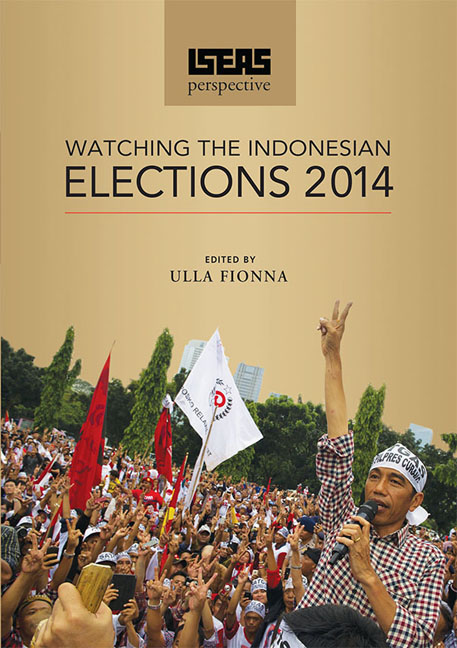Book contents
- Frontmatter
- Contents
- Foreword
- Introduction
- 1 The Gubernatorial Race in Jakarta: Background and Implications
- 2 Indonesian Parties Struggle for Electability
- 3 Who Will Be Indonesian President in 2014?
- 4 Indonesian Presidential Election Forcing Rejuvenation of Parties
- 5 Resisting Democracy: Front Pembela Islam and Indonesia's 2014 Elections
- 6 Getting to Know the Contestants of the 2014 Indonesian Parliamentary Elections
- 7 A Snapshot of the Campaigning in Indonesia's 2014 Legislative Elections
- 8 Unpacking the Results of the 2014 Indonesian Legislative Elections
- 9 Indonesia's 2014 Legislative Elections: The Dilemmas of “Elektabilitas” Politics
- 10 The Islamic Factor in the 2014 Indonesian Elections
- 11 Vote-buying in Indonesia's 2014 Elections: The Other Side of the Coin
- 12 Gap Narrows Between Candidates in Indonesian Presidential Elections
- 13 Analysing the Economic Platforms in the Indonesian Presidential Election
- 14 Indonesian Islamic Parties After the 2014 Elections: Divided and Self-Centred
- 15 Safeguarding Indonesia's Pluralism: An Essential Task for Joko Widodo
- 16 Jokowi's Key Economic Challenge: Improving Fiscal Policy for Equitable Growth
- 17 Crossing the River While Avoiding the Stones: Jokowi's Run-up to the Presidency
- 18 Post-elections Indonesia: Towards a Crisis of Government?
- Epilogue: Jokowi's First Months: Compromise Cabinet, Subsidy Cuts, and Corrupt Coalition
2 - Indonesian Parties Struggle for Electability
Published online by Cambridge University Press: 29 July 2017
- Frontmatter
- Contents
- Foreword
- Introduction
- 1 The Gubernatorial Race in Jakarta: Background and Implications
- 2 Indonesian Parties Struggle for Electability
- 3 Who Will Be Indonesian President in 2014?
- 4 Indonesian Presidential Election Forcing Rejuvenation of Parties
- 5 Resisting Democracy: Front Pembela Islam and Indonesia's 2014 Elections
- 6 Getting to Know the Contestants of the 2014 Indonesian Parliamentary Elections
- 7 A Snapshot of the Campaigning in Indonesia's 2014 Legislative Elections
- 8 Unpacking the Results of the 2014 Indonesian Legislative Elections
- 9 Indonesia's 2014 Legislative Elections: The Dilemmas of “Elektabilitas” Politics
- 10 The Islamic Factor in the 2014 Indonesian Elections
- 11 Vote-buying in Indonesia's 2014 Elections: The Other Side of the Coin
- 12 Gap Narrows Between Candidates in Indonesian Presidential Elections
- 13 Analysing the Economic Platforms in the Indonesian Presidential Election
- 14 Indonesian Islamic Parties After the 2014 Elections: Divided and Self-Centred
- 15 Safeguarding Indonesia's Pluralism: An Essential Task for Joko Widodo
- 16 Jokowi's Key Economic Challenge: Improving Fiscal Policy for Equitable Growth
- 17 Crossing the River While Avoiding the Stones: Jokowi's Run-up to the Presidency
- 18 Post-elections Indonesia: Towards a Crisis of Government?
- Epilogue: Jokowi's First Months: Compromise Cabinet, Subsidy Cuts, and Corrupt Coalition
Summary
In February 2013, leaders of Indonesia's two major political parties were detained on graft suspicions. The arrests of Partai Keadilan Sejahtera's (PKS, Prosperous Justice Party) president Luthfi Hasan Ishaaq, and Partai Demokrat's (PD, Democratic Party) chairman Anas Urbaningrum have jeopardized their respective parties’ electoral prospects. While Luthfi has been arrested for suspicions over special favours for certain beef importers, Anas — previously linked to other corruption cases — has allegedly received a luxury car as a bribe for fixing a government construction contract for the Hambalang sports centre project.
The arrests followed a string of other high-profile party politicians who are facing corruption charges. Indonesia's Corruption Eradication Commission (Komisi Pemberantasan Korupsi, KPK) have previously detained Andi Mallarangeng (former Sports and Youth Affairs Minister), and jailed Angelina Sondakh (PD's deputy secretary general) and Muhammad Nazaruddin (PD's former treasurer). Late last year, the Jakarta Corruption Court has also sentenced Wa Ode Nurhayati, a former member of the House of Representatives budgetary committee from the Partai Amanat Nasional (National Mandate Party).
For the parties involved, a lot is riding on the back of these cases. With the 2014 general election looming, parties need to figure out how to react and manage these crises. Internal conflicts and organizational problems also have to be addressed urgently. More broadly, these cases highlight the fact that the costs of party politics are high in Indonesia, and the systemic problems of party corruption needs urgent attention from the parties and the state.
PKS: THE CHALLENGE TO STAY “CLEAN” AND ISLAMIC
Born of the Jemaat Tarbiyah (Education Movement), PK (Partai Keadilan, Justice Party), the predecessor of PKS, was founded in 1998. After failing to gain a minimum of 2 per cent of the national votes in 1999, which was necessary to qualify for the next elections, the party was re-constituted as PKS in 2003 to run in the 2004 elections. As the largest Islamic party in Indonesia, which prides itself as “clean and caring”, the PKS also has impressive organizational prowess, rivalled only by Partai Golkar, which has been dominant over the thirty-two years of the New Order's rule. PKS’ young, committed, and technology-savvy cadres are the backbone of the frequent and wide-ranging activities at the grassroots.
- Type
- Chapter
- Information
- ISEAS PerspectiveWatching the Indonesian Elections 2014, pp. 8 - 15Publisher: ISEAS–Yusof Ishak InstitutePrint publication year: 2015

